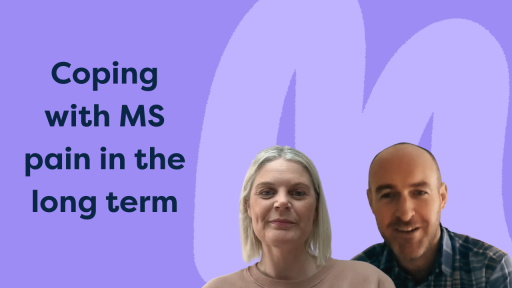Stem cell transplantation is increasingly in the news. We take a look behind the headlines and find out what the treatment actually entails.
In this article we discuss a type of stem cell treatment called autologous haematopoietic stem cell transplantation (AHSCT) which is offered to a small number of people on the NHS each year. Professor Basil Sharrack, a consultant neurologist who’s involved in researching AHSCT in MS, answers some frequently asked questions.
What is stem cell transplantation?
Basil says: In conditions where the immune system is responsible for causing an illness, like MS, then changing the faulty immune system with a fresh one can help stop the damage the immune system is causing. This is the aim of stem cell transplantation.
The process involves harvesting your own stem cells, which live deep in the bone marrow, and storing them. Then we give individuals a high dose of chemotherapy which reduces the number of immune cells in the body, good and bad, and then we reintroduce the stem cells which we harvested back into the blood. These stem cells are very clever. They find their way around the body and back to the bone marrow and start producing new immune cells.
By doing this, you’re giving the body a fresh start in terms of providing a new immune system which has not been exposed to whatever caused MS in the first instance. Stem cell transplantation can, therefore, stop MS in its tracks.
Who is stem cell transplantation suitable for?
Basil says: Neurologists will look at what’s causing the problem in a particular phase of somebody’s MS. Stem cell transplantation is a very powerful anti-inflammation treatment. If inflammation is the main cause of the problem at a particular stage in somebody’s MS, then this treatment will hopefully stop that and help that person. When we talk about active inflammation, we’re talking about people who are having relapses and show signs of disease activity on an MRI scan.
If there’s no evidence of active inflammation in a particular individual, then this treatment might not be that helpful. Unfortunately, the stem cells we use can’t repair damaged parts of the brain and spinal cord. They can only modify and rectify a faulty immune system.
That isn’t to say that stem cell transplantation isn’t effective in people with progressive MS. People who have a significant element of inflammation but have progressive disease will probably gain some benefit from stem cell transplantation. However, the benefit will probably be limited compared to people with relapsing remitting MS (RRMS).
We select who we treat very carefully because it’s a really tough treatment and we need to make sure that the people who receive this treatment are fully aware of what’s involved and the implications both in the short and long run. For instance, the treatment will have an effect on fertility, both for women and men, so it’s important to discuss that upfront and mitigate for any risks by storing sperm and eggs.
How long does the treatment take? How quickly do people recover?
Basil says: The treatment starts with you coming into hospital where we harvest your stem cells. We do that by giving certain drugs which move the stem cells from the bone marrow into the bloodstream. Then we harvest the cells from the bloodstream, taking them from a large vein.
At the same time, because the drug we normally use to activate the stem cells can cause inflammation, we give individuals a small dose of chemotherapy.
Once we’ve harvested the stem cells, we allow a bit of time for you to recover. We’d then bring you back into the hospital a few weeks later to give you a very large dose of chemotherapy. This wipes out the faulty immune cells. This leaves you with no effective immune system so you have to be kept in isolation for, on average, about four weeks.
Once you’ve received the chemotherapy, we inject the stem cells back into the body through a vein. These stem cells make their way to the bone marrow and start producing immune cells. We monitor people very carefully as this is a very critical period. You will be very prone to infections at this stage and the large dose of chemotherapy will make you feel unwell. You may get a sore mouth, experience loose stools and generally feel unwell to various degrees.
There is a risk of death with this treatment due to infections, however this risk is gradually reducing as procedures improve. Looking at transplants carried out since 2005, the risk of death as fallen over that time.
Once your white cell count has recovered, which means you’re not as at risk of getting infections, you’re allowed to leave the hospital but will be monitored very carefully on a weekly basis with repeated blood counts.
In terms of recovery, people often need physiotherapy as well as psychological support. The whole process takes about three months for people to feel back to their normal selves. It is a long process.
How does this treatment compare to disease modifying drugs (DMDs) in terms of how effective it is?
Basil says: We think it is far more effective than the DMDs we have at the moment, although we don’t have trial evidence to support this statement 100%. We have trial evidence to suggest this treatment is far more effective than some first line DMDs, in particular the beta interferons, Copaxone, Tecfidera, Aubagio, but also some of the stronger therapies like Gilenya and Tysabri.
We don’t have head-to-head comparison between stem cell treatment and Ocrevus, Lemtrada and Mavenclad. Individual studies suggest stem cell treatment is far more effective, but we need to confirm this by doing a head-to-head comparison. This is what we hope to achieve from the StarMS study which will hopefully begin in the UK in the next few months.
Can you tell us more about the StarMS study? How can people get involved?
Basil says: The StarMS study will compare the effectiveness of Lemtrada and Ocrevus (and possibly Mavenclad) against stem cell treatment in people with RRMS.
We’re creating a website for the study where you can access and read about the nature of the trial, the inclusion criteria and the participating sites.
We’re hoping to have 19 sites around the UK where people can take part. If you’re interested in the trial, you can read about the StarMS study.
Unfortunately we’re dealing with uncertainty in relation to Covid-19, but we hope that the StarMS study will start in the late spring, providing the vaccine rollout has been successful.
Are there are other types of stem cell treatment currently being researched that might be suitable for people with progressive MS?
Basil says: Mesenchymal stem cells are currently being trialled in progressive MS. They are a different type of stem cell that we all have in our body. Mesenchymal stem cells are not responsible for building the immune system but they provide support to nerves in the brain and spinal cord.
There is very encouraging evidence from phase one and phase two studies suggesting that it will be effective in progressive MS, but it's not currently a standard treatment.
We often see articles in the media promoting the benefits of stem cell transplantation in MS, sometimes it’s even claimed to be a cure, but what exactly does the research say?
Basil says: The evidence suggests that it is far more effective than anything we have at the moment, but in the right patient group. This means in people with MS who have active inflammatory disease despite the use of standard therapy. The benefit they will gain from stem cell transplantation is far more than receiving the majority of the drugs we can offer them otherwise.
Despite all of this, it’s not a cure and not everyone who receives the treatment will remain without MS activity later on. In the first few years, the majority of people who’ve had stem cell transplantation will experience no further evidence of disease activity. That means no evidence of relapses, no evidence of MRI scan disease activity and no progression of their disability. There are unfortunately a small proportion of people, probably about 20%, where MS activity will emerge again, but even in those people it will not be as aggressive as before and they usually respond to treatment a little bit better. So, stem cell transplantation is very effective, but it’s not a miracle cure.
Can people with MS access this treatment on the NHS?
Basil says: Yes, there are hospitals offering the treatment on the NHS in Sheffield and in London. If you think you might be eligible, the best thing to do would be to discuss the treatment with your neurologist. If they think stem cell transplantation would be right for you, they’d be able to refer you to one of the sites offering this treatment on the NHS.
Once the StarMS study is running, there will be more sites around the UK offering the treatment through this clinical trial.
Professor Basil Sharrack is a consultant neurologist at Royal Hallamshire Hospital, Sheffield. His main research area is autologous haematopoietic stem cell transplantation in MS.



